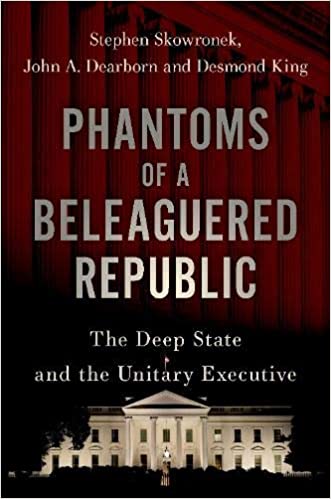Spotlight on John Dearborn: Inspiring Students & Advancing A Career with a Post-Doctoral Fellowship at an Elite University
 In the last year, JMC’s approach to post-doctoral fellowships has shifted toward supporting two-year fellowships that allow for a deeper level of research, more teaching experience, and greater prospects in the job market.
In the last year, JMC’s approach to post-doctoral fellowships has shifted toward supporting two-year fellowships that allow for a deeper level of research, more teaching experience, and greater prospects in the job market.
John Dearborn holds one such fellowship as the 2019-2021 Postdoctoral Fellow in Political Science at Yale University. John has already seen immense success, designing and teaching classes in American political thought and government, working on two book projects, and receiving two awards for his dissertation.
Below, he shares the multi-faceted impact his fellowship has had:
 JMC: How has your JMC postdoctoral fellowship helped you to further your career?
JMC: How has your JMC postdoctoral fellowship helped you to further your career?
Dearborn: My JMC fellowship has given me the time, space, and opportunity to revise my dissertation and to turn it into a book. Power Shifts: Congress and Presidential Representation is now forthcoming with the University of Chicago Press. In addition to finishing that book, I also collaborated on a book that looks at contemporary presidential controversies, called Phantoms of a Beleaguered Republic. It was huge to have the support to work on not only one, but two book projects. My work on Phantoms has entirely occurred during the JMC fellowship, and I don’t think it would have been possible were I not here.
It has been so rewarding to increasingly see just how complementary those projects were to each other and how, in tandem, I was able to distill a better picture of presidential history over the entirety of the 20th century.
I’ve been teaching, too. I’ve previously gotten some experience as a teaching fellow of sorts under academic mentors, but this fellowship has allowed me the opportunity to develop my own courses and then be the instructor of record for them.
JMC: How have students responded to your courses?
Dearborn: They have responded really well to them. A number of students have chosen to return for a second class with me. I think my students appreciate that I consistently take historical topics and, no matter what time period we’re looking at, connect them to current day events. We’ll look at what the founders might have said about a concept. We’ll look at what some presidents or members of Congress have said about a concept at key moments in our history. And then, finally, we’ll look at contemporary controversies. My students really appreciate not only getting that historical perspective in the classroom, but having that perspective be put to use in our own times.

I have two favorite things about my students at Yale.
First, I enjoy seeing the look in their eyes when they recognize something fundamental – you can tell that they’re thinking about a question (whether it’s representation or Congress or the presidency) in a new way. It’s fun to see the light bulb go off.
Second, and much more importantly, is seeing my students start to engage these issues themselves. They are debating these important questions and asking, “Well, what does this mean?”
Provoking this curiosity and understanding is what being an educator is all about. It’s my favorite thing as a teacher.
JMC: What are your career plans post-fellowship?
Dearborn: My main goal is to have an academic faculty position. I’ve only loved teaching more and more while here at Yale.
I’m in much better shape to enter the academic job market thanks to my fellowship with JMC. It has been absolutely crucial in transforming me from a promising grad student into someone with bona fide teaching and research experience. I’m grateful for the time and space to accomplish this.
 JMC: Why do research and writing matter when your goal is largely to teach undergraduates?
JMC: Why do research and writing matter when your goal is largely to teach undergraduates?
Dearborn: For one thing, conducting research keeps me up to date with the newest scholarship on the Presidency, Congress, and American political development. Conducting historical research also impacts how I structure classes, including how I pair secondary scholarship with primary sources. Doing research and bring it into the classroom provides an opportunity to talk with students about how political science research actually happens, what kinds of questions can be asked, and how to evaluate different types of evidence.
JMC: Have you kept in contact with anyone from your summer institute? Do you think your JMC connections will be helpful in your job search?
Dearborn: The 2018 Summer Institute was a great experience for me and my academic career. It was intellectually amazing to see such a focus on the founding. Furthermore, I had a unique opportunity to debate ideas with many like-minded scholars that believe that these ideas matter to our country and American politics. I’m so grateful to be a part of this network of scholars.
The summer institute helped expand my network both of faculty members who are familiar with my work and interests and the many emerging scholars doing really interesting work in American political development and political thought. I do keep in touch with my JMC network and am always excited to see familiar faces at conferences, for example. I feel a part of a great academic community and always benefit from exchanging ideas with JMC fellows. And I do think that network will also prove helpful as I’m on the job market now.
Learn more about John Dearborn >>
![]()
![]() Follow us on Facebook and Twitter for updates about lectures, publications, podcasts, and events related to American political thought, United States history, and the Western tradition!
Follow us on Facebook and Twitter for updates about lectures, publications, podcasts, and events related to American political thought, United States history, and the Western tradition!
Want to help the Jack Miller Center transform higher education? Donate today.


 JMC: Why do research and writing matter when your goal is largely to teach undergraduates?
JMC: Why do research and writing matter when your goal is largely to teach undergraduates?